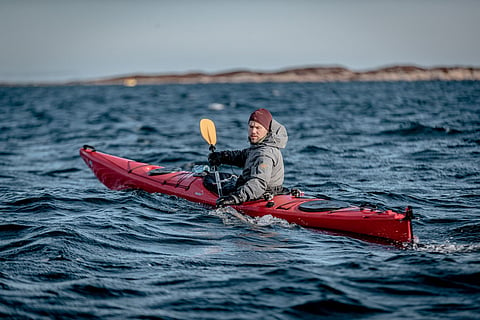

Andreas Skagøy has always been interested in biology and the medicine part of things. Before taking the position of Fish Health Manager at Måsøval AS, he had time to work as a consultant. He even write "Et liv ute", a book based on his travels together with his wife through Norway, Sweden, and Finland.
I grew up along the coast of Norway where there are too many small places, quite scarcely habited. But still producing a lot of net value for the true industry, either being fisheries or fish farming or other types of industry.
I wanted to start in salmon farming because it is one of the very most important industries for local communities along the coast. Having a strong fish farming industry that is sustainable is key to making sure the next generation can still find exciting job opportunities and good society years ahead.
I am a Fish Health Manager for the whole company. My role is all about ensuring good fish health and welfare throughout the production cycle, from roe to harvest. We are responsible for each fish in our custody. Also, we ought to make sure they are treated well according to both regulations and our ethical standards.
This task manifests itself in many ways from training the personnel and keeping good dialogue with both authorities' suppliers, to implementation of new technology and R&D. A lot of work is on a strategic level, but then, of course, a lot of it is also on a more operational level where you work with the fish health biologists and the veterinaries that we hire to do our fieldwork and try to map out what is the status on each site in each pen.
In January, Måsøval AS bought a set of five companies in the fjords, a bit further south from our main locations. We are now building a second production area with seven sites on sea and land, in addition to harvesting and storing facilities. As a result, I was asked to take on a position as area manager, coordinating and developing Måsøval AS activity in this new area.
Most of all we are pioneers. From the seventies, Måsøval AS has been continuously seeking new ways of doing things. That is a part of our DNA and that's not necessarily just related to large and visionary projects, but also and even more to do these incremental small changes from day-to-day. We have been doing very interesting projects that have been good for us, but it's kind of the day-to-day development that really adds up in the end.
When you look at the smaller things, it will be, for example, implementing new software for data analysis or improving the way we crowd fish, or systematically identifying risk factors in operations, so that the next time we can correct them. And then, of course, you have the larger projects. For example, our innovative Aqua Semi is a new way of doing fish farming.
On one side, sea lice is still going to be one of the most important and time-consuming equations to be solved in the upcoming years. We are getting better and better as an industry to both on the surveillance part and the handling part, but still, we are not looking at the long-term solutions yet. So, at least for five years, I think that will be something we're battling with.
Many of the gill and heart-related diseases are other tough challenges, where a long-term cure is still to be found. However, this issue has many sides to it. We need to better prevent the pathogens from causing an outbreak, but we also need to make sure that the fish is given a healthy diet that ensures heart and gill function throughout its life span. Working closely with the breeding programs and further developing our sites in order to improve environmental conditions are also crucial aspects. I think this combination is the single largest health issue in Norwegian salmon farming today.
Honestly, I think that the industry is doing a great job dealing with these issues. Both researchers, inventors, tech start-ups, and farmers are developing and testing new approaches and possible solutions rapidly.
The keyword here is prevention. We need to keep our focus on finding new and better proactive ways to prevent sea lice and pathogens from "succeeding" in their quest. And we need to make sure we breed and feed our salmon in a way that ensures robust health and good welfare.
In order to stay at the forefront of global salmon farming, a good long-term connection between the actors has been crucial. We learn from each other and cooperate when it comes to tackling big issues like sea lice. In our production areas, we coordinate our production with the other farmers, in order to reduce biological risk and increase the production potential. Our ability to cooperate and coordinate our operations has been extremely important when it comes to building up a sustainable large-scale production of salmon.
I expect to take part in the future of Norwegian aquaculture. In my opinion, the most exciting place to be is in the cross-section between technology and biology, developing new strategies for salmon farming. There are many alternatives lining up at the moment, and we need to choose wisely in order to stay highly competitive as an industry. The world needs more sustainable food production and Måsøval AS can bring the solution to the table.
